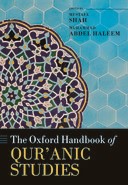 The Oxford Handbook of Qur'anic Studies
The Oxford Handbook of Qur'anic Studies
Contents
-
-
-
-
-
-
-
-
-
-
-
-
-
-
The Question of the Discontinuity of the Qur’anic Text The Question of the Discontinuity of the Qur’anic Text
-
The Order of the Suras in the Qur’an The Order of the Suras in the Qur’an
-
The Coherence of the Text According To the Classical Tradition: Naẓm and ʿIlm al-Munāsaba The Coherence of the Text According To the Classical Tradition: Naẓm and ʿIlm al-Munāsaba
-
The Unity of the Text by Modern Muslim Commentators The Unity of the Text by Modern Muslim Commentators
-
The Structure of the Qur’anic Text, According to Recent Research The Structure of the Qur’anic Text, According to Recent Research
-
Semitic Rhetoric and Rhetorical Analysis Semitic Rhetoric and Rhetorical Analysis
-
Bibliography Bibliography
-
-
-
-
-
-
-
-
-
-
-
-
-
-
-
-
-
-
19 Qur’anic Syntax
Get accessMichel Cuypers Doctor of Persian Literature (University of Teheran, 1983), is a member of the Dominican Institute for Oriental Studies (Cairo), specializing in the exegesis of the Qur’an and the text’s composition according to the theory of Semitic rhetoric. His publications include The Banquet: A Reading of the Fifth Sura of the Qur’an (Convivium Press, 2009), and The Composition of the Qur’an (Bloomsbury, 2015), and A Qur’ānic Apocalypse: A Reading of the Thirty-Three Last Sūrahs of the Qur’ān (International Qur’ānic Studies Association, 2018).
-
Published:08 June 2020
Cite
Abstract
In this study, ‘syntax’ means the way the diverse parts of a sura or diverse suras are connected between each other to compose coherent sets with semantic unity. The classical Islamic tradition (al-Zarkāshī, al-Suyūṭī, al-Biqāʿī …) has partially studied it under the titles of naẓm, ‘composition (of the text)’, and ʿilm al-munāsaba, ‘the science of correlation (between verses or suras)’. Some modern Muslim exegetes (Amīn Aḥsan Iṣlāḥī, Saʿīd Ḥawwā) pushed the syntax analysis further, in an original way. Orientalists (Neuwirth, Crapon de Caprona, Salwa El-Awa, Robinson, Zahniser) have been interested in the syntax of the text since 1980. Cuypers elaborates on the Semitic rhetoric, discovered in biblical studies but perfectly applicable to the Qur’anic text.
Sign in
Personal account
- Sign in with email/username & password
- Get email alerts
- Save searches
- Purchase content
- Activate your purchase/trial code
- Add your ORCID iD
Purchase
Our books are available by subscription or purchase to libraries and institutions.
Purchasing information| Month: | Total Views: |
|---|---|
| October 2022 | 9 |
| November 2022 | 1 |
| December 2022 | 7 |
| January 2023 | 13 |
| February 2023 | 12 |
| March 2023 | 10 |
| April 2023 | 6 |
| May 2023 | 4 |
| June 2023 | 4 |
| July 2023 | 8 |
| August 2023 | 8 |
| September 2023 | 2 |
| October 2023 | 6 |
| November 2023 | 4 |
| December 2023 | 9 |
| January 2024 | 4 |
| February 2024 | 13 |
| March 2024 | 2 |
| April 2024 | 1 |
| May 2024 | 3 |
| June 2024 | 16 |
| July 2024 | 3 |
| August 2024 | 1 |
| October 2024 | 4 |
| November 2024 | 2 |
| December 2024 | 2 |
| January 2025 | 9 |
| February 2025 | 5 |
| March 2025 | 2 |
| April 2025 | 4 |
| May 2025 | 1 |

Get help with access
Institutional access
Access to content on Oxford Academic is often provided through institutional subscriptions and purchases. If you are a member of an institution with an active account, you may be able to access content in one of the following ways:
IP based access
Typically, access is provided across an institutional network to a range of IP addresses. This authentication occurs automatically, and it is not possible to sign out of an IP authenticated account.
Sign in through your institution
Choose this option to get remote access when outside your institution. Shibboleth/Open Athens technology is used to provide single sign-on between your institution’s website and Oxford Academic.
If your institution is not listed or you cannot sign in to your institution’s website, please contact your librarian or administrator.
Sign in with a library card
Enter your library card number to sign in. If you cannot sign in, please contact your librarian.
Society Members
Society member access to a journal is achieved in one of the following ways:
Sign in through society site
Many societies offer single sign-on between the society website and Oxford Academic. If you see ‘Sign in through society site’ in the sign in pane within a journal:
If you do not have a society account or have forgotten your username or password, please contact your society.
Sign in using a personal account
Some societies use Oxford Academic personal accounts to provide access to their members. See below.
Personal account
A personal account can be used to get email alerts, save searches, purchase content, and activate subscriptions.
Some societies use Oxford Academic personal accounts to provide access to their members.
Viewing your signed in accounts
Click the account icon in the top right to:
Signed in but can't access content
Oxford Academic is home to a wide variety of products. The institutional subscription may not cover the content that you are trying to access. If you believe you should have access to that content, please contact your librarian.
Institutional account management
For librarians and administrators, your personal account also provides access to institutional account management. Here you will find options to view and activate subscriptions, manage institutional settings and access options, access usage statistics, and more.